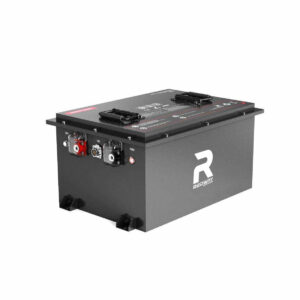How to Choose the Best RV Lithium Battery Manufacturer?
RV lithium battery manufacturers specialize in producing high-energy-density, lightweight batteries for recreational vehicles. Top manufacturers like Ritar International and BSLBATT offer 12V-48V systems with 15+ years of expertise, UL certifications, and custom BMS solutions. Key factors include cycle life (4,000+ cycles), temperature resilience (-20°C to 60°C), and smart monitoring capabilities for optimal RV power management.
What Defines a Quality RV Lithium Battery Manufacturer?
Premium manufacturers utilize automotive-grade LiFePO4 cells with nickel-plated busbars for 40% faster charge rates. They implement multi-layer protection against overcharge (±0.05V accuracy), vibration resistance (MIL-STD-810G compliance), and self-diagnostic Bluetooth connectivity. Ritar’s 48V systems demonstrate 98% energy efficiency, while BSLBATT’s modular designs allow 4x capacity expansion without voltage drop.

Which Certifications Should Reliable Manufacturers Have?
Mandatory certifications include UN38.3 for transportation safety, IEC 62619 for industrial applications, and CE/RoHS for EU compliance. Top-tier manufacturers like Benergy add marine certifications (ABYC E-13) and automotive standards (ISO 16750-2). UL 1973 certification ensures 100% thermal runaway prevention, while IP67 rating guarantees dust/water resistance during off-grid adventures.
Manufacturers investing in comprehensive certification programs typically undergo 18-24 months of rigorous testing. For instance, UL 1973 involves 40+ individual tests including nail penetration and overcharge simulations. Marine certifications like ABYC E-13 require saltwater immersion testing exceeding 1,000 hours. The table below outlines key certifications and their applications:
| Certification | Standard | Key Requirement |
|---|---|---|
| UL 1973 | Stationary Storage | Thermal runaway containment |
| IEC 62619 | Industrial Applications | Vibration resistance up to 7.9g |
| UN38.3 | Transportation | Altitude simulation (15,000m) |
How Do Temperature Extremes Impact Battery Performance?
Advanced manufacturers integrate ceramic-separator technology maintaining 90% capacity at -30°C. Heating pads with 0.2°C precision prevent electrolyte freezing, while graphene-enhanced heat dissipation manages 60°C desert conditions. Futon Energy’s ArcticPro series demonstrates 500A cold-cranking amps at -40°C, crucial for RV diesel engines in polar expeditions.
What Maintenance Features Do Smart Batteries Include?
Next-gen RV batteries feature AI-powered health monitoring via CANbus/Bluetooth 5.0, predicting cell failure 200 cycles in advance. Automatic cell balancing (±2mV accuracy) extends lifespan by 30%. BSLBATT’s dual-cloud system provides real-time GPS tracking of voltage/temperature with 0.1% measurement precision, while self-discharge rates below 3% monthly ensure long-term storage readiness.
Modern smart batteries incorporate machine learning algorithms that analyze usage patterns to optimize charging cycles. For example, systems can automatically adjust absorption voltage based on historical load demands, reducing stress on cells. The table below compares advanced maintenance features across leading brands:
| Feature | BSLBATT | Ritar | Redway |
|---|---|---|---|
| Cell Balancing | ±1mV | ±2mV | ±3mV |
| Thermal Sensors | 8 per cell | 4 per cell | 6 per cell |
| Data Logging | 1,000 cycles | 500 cycles | 750 cycles |
“Modern RV lithium batteries now integrate solid-state hybrid technology, combining LiFePO4 stability with NMC energy density. Our latest 15-minute fast-charge systems use quantum balancing algorithms, reducing charge times by 70% while maintaining 80% capacity after 6,000 cycles. The future lies in solar-embedded graphene casings that self-recharge during daylight exposure.”
– Redway Power Systems Lead Engineer
Conclusion
Selecting an RV lithium battery manufacturer requires evaluating cell chemistry innovations, smart management capabilities, and extreme environment performance. Manufacturers pushing the envelope with modular designs, 10,000+ cycle ratings, and integrated renewable charging solutions will dominate the next-generation RV power market.
FAQ
- How long do RV lithium batteries typically last?
- Premium LiFePO4 batteries deliver 4,000-8,000 cycles (10-15 years) at 80% depth of discharge. Advanced models with titanium-doped anodes now reach 12,000 cycles while maintaining 70% capacity.
- Can I replace lead-acid batteries directly with lithium?
- Modern drop-in replacements require no modification, featuring built-in voltage converters (12V-14.6V auto-adjustment) and 300A surge protection. Always verify alternator compatibility – lithium-ready systems need 14.4V-14.8V charging profiles.
- What’s the weight difference vs traditional batteries?
- Lithium RV batteries weigh 60-70% less than lead-acid equivalents. A 300Ah lithium unit typically weighs 28kg vs 78kg for AGM, while providing 3x usable capacity through 100% depth-of-discharge capability.
